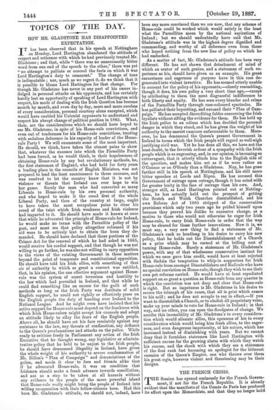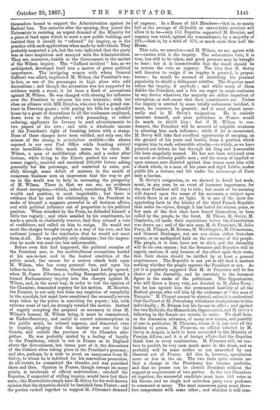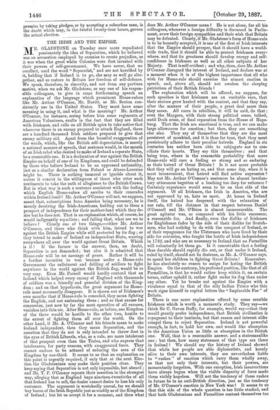THE FRENCH CRISIS.
?THE Session has opened ominously for the French Govern- ment, if not for the French Republic. It is already evident that the manifesto of the Comte de Paris has produced its effect upon the Monarchists, and that they no longer hold
themselves bound to support the Administration against its Radical foes. Ten minutes after the opening, they joined the Extremists in resisting an urgent demand of the Ministry for a piece of land upon which to erect a new public building, and insisted that it should be "referred" for inquiry, as is the Practice with such applications when made by individuals. They probably suspected a job, but the vote indicated that the party was at once suspicions and annoyed with the Administration. They are, moreover, hostile to the Government in the matter of the Wilson inquiry. The " Caffarel incident" has, as we anticipated, developed itself into a matter of grave political importance. The intriguing women with whom General Caffarel was allied, implicated M. Wilson, the President's son- in-law, as one of the personages in high place who sold decorations ; and though the accusation was not supported by evidence worth a straw, it let loose a flood of accusations against M. Wilson. He was charged with abusing his influence over the President to advance his own interests; with too close an alliance with MM. Dreyfus, who once had a grand con- tract in Peruvian guano ; with paying his bills for a splendid house by a grant of decorations to all the tradesmen employed, down even to the plumber ; with persuading, or rather ordering, applicants for favours to send advertisements to two papers of his own ; and with a wholesale misuse of the President's right of franking letters with a stamp. None of these charges have been verified, and only one, the misuse of the stamp, is primci-facie credible—the abuses exposed in our own Post Office while franking existed were incredible—but this much seems to be clear. M. Wilson, a man of multifarious affairs, and a seeker after fortune, while living in the Elyse° pushed his own busi- nesses eagerly, received and answered 200,000 letters asking generally for his patronage, and contrived to raise, pos- sibly through some defect of manner, in the minds of numerous business men an impression that the way to get on in the world was to help in increasing the prosperity of M. Wilson. There is, that we can see, no evidence of direct corruption,—which, indeed, considering M. Wilson's wealth and position, is most improbable ; but there is evidence that he used his relationship to the President to make of himself a magnate powerful in all business affairs, and with political influence out of proportion to his political position. When attacked by the Press, he defended himself a little too vaguely ; and when assailed by his constituents, he made a speech so obstinately evasive, that they refused a vote of confidence, and called on him to resign. He would not meet the charges brought except in a way of his 0711, and his audience jumped to the conclusion that he would not meet them at all. He was probably only obstinate ; but the impres- sion he made was none the less unfavourable.
Before even this had happened, the political enemies of the President saw, in the multitudinous accusations hurled at his son-in-law, and in the heated condition of the pubiic mind, the means for a serious attack both upon M. Wilson, who has many personal foes, and upon his father-in-law. The Session, therefore, had hardly opened, when M. Cuneo d'Ornano, a leading Bonapartist, proposed a formal Parliamentary inquiry into the charges against M. Wilson, and, in the usual way, in order to test the opinion of the Chamber, demanded urgency for his motion. M. Rouvier, the Premier, is not only free from any suspicion of complicity in the scandals, but must have sanctioned the unusually severe steps taken by the police in searching for papers ; but, with extreme want of tact, he strongly resisted the motion. Instead of eagerly accepting the proposal as necessary to clear M. Wilson's honour, M. Wilson being, it must be remembered, art Under-Secretary, and useful to correct misconceptions in the public mind, he refused urgency, and demurred even to inquiry, alleging that the matter was one for the Courts, and outside the province of the Chamber alto- gether. He was probably misled by a feeling of loyalty to the Presidency, which is not in France as in England
above the Government, but forms part of it, the discussions of the Cabinet often taking place in the President's presence ; and also, perhaps, by a wish to avert an annoyance from M. Grevy, to whom he is indebted for his marvellous promotion. At all events, he committed the blunder, and was punished there and then. Opinion in France, though corrupt on many points, is intolerant of official malversation ; one-half the Deputies, if suspected of stifling inquiry, would have lost their seats ; the Monarchists simply bate M. Grevy for his well-known opinion that the dynasties should be banished from France ; and the parties rushed together to support M. d'Ornano's demand
of urgency. In a House of 534 Members—that is, as nearly full as the average of ill-health or unavoidable accident will allow it to be—only 155 Deputies supported M. Rouvier, and urgency was voted, against his remonstrance, by a majority of 224,—that is, by a total of 379, or much more than half the House.
This vote, we conceive—and M. Wilson, we see, agrees with us—carries with it the inquiry. The substantive vote, it i8 true, has still to be taken, and great pressure may be brought to bear ; but it is inconceivable that the result should be to reverse the vote on urgency. The idea that M. Gravy will threaten to resign if an inquiry is granted, is prepos- terous; he would be accused of stretching his personal popularity to shield a delinquent relative. The Deputies must refuse the inquiry, if anybody ; and while many of them dislike the President, and a few are eager to cause confusion by any device whatever, the majority are either impatient of corruption, or well aware that their constituents are. Unless the inquiry is averted by some totally unforeseen incident, it must, we conceive, be granted ; and it must almost neces- sarily end in M. Grey's resignation. He is entirely innocent himself, and most politicians in France would do much to shield him ; but if M. Wilson is con- demned, the President will be accused of culpable weakness in allowing him such influence ; while if he is exonerated, M. Grey will take that excellent opportunity of escaping, on the ground of his years and health, from a position which exposes him to such unbearable attacks,—to which, saws have pointed out before, he has through his long and honourable life been singularly unused. He has not been criticised even so much as ordinary public men ; and the storm of implied or open censure now directed against him comes upon him with a shock which, to a man of his years and rigid habits, makes public life a torture, and life under the microscope of Paris only a burden.
Grevy's resignation, as we showed in detail last week, must, in any case, be an event of immense importance, for the next President will try to rule ; but much of its meaning will depend upon the name of his successor, a subject upon which there is as yet no light. It is one of the most dis- appointing facts in the history of the third French Republic that under its rigime, though it has lasted for sixteen years, so few men of the first class have forced themselves, or been called by the people, to the front. M. niers, M. Grevy, M. Gambetta, all made their reputations before the Constitution was drawn up ; and of the new men, M. de Freycinet, M. Jules Ferry, M. Floquet, M. Brisson, M. Waddington, M. Clemenceau, and General Boulanger, not one can claim either first-class repute, or an undisputed hold on the reverence of the people. The people, it is true, have not to elect, and the Assembly will be its own caucus ; but the Senators and Deputies will be eagerly anxious, if only because of the effect upon their seats, that their choice should be ratified by at least a general acquiescence. The Republic is not yet so old that it matters nothing whether the people approve the President or not. As yet it is popularly supposed that M. de Freyeinet will be the choice of the Assembly, and he certainly is the foremost figure in the ranks of the politicians. The Opportunists, who will throw a heavy vote, are devoted to M. Jules Ferry ; but he has against him the pronounced hostility of all the Radical groups, who call him by the nickname of "the man of Tonquin." M. Floquet cannot be elected, unless it is understood that the Court of St. Petersburg withdraws its objections to him individually ; M. Brisson lost his favour in office ; and against the two Radicals, the Monarchists, Opportunists, and U. Grevy's
following in the Senate are certain to unite. We shall hear, as the discussion advances, of many new names, and possibly of one in particular, M. Flourens, whom it is just now all the fashion to praise. M. Flourens, an official selected by M. Grevy in despair, is held to have succeeded in the Ministry of Foreign Affairs, and it is of foreign affairs that the Deputies
think first in every combination. M. Flourens will, we ven- ture to predict, be very soon much more in the front, and so
probably will be some soldier as yet unmarked by any observer out of France. All this is, however, speculation more or less in the air. The two facts quite certain are that a change in the Presidency has become probable, and that no person can be elected President without the support or acquiescence of two parties. As the two Chambers sit together, the successful candidate must have 443 votes in his favour, and no single and unbroken party even professes to command so many. The most numerous party must there- fore compromise with some other ; and whether it will corn- promise by taking pledges, or by accepting a colourless man, is the doubt which may, in the fateful twenty-four hours, govern the actual election.




































 Previous page
Previous page